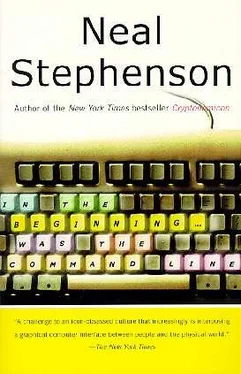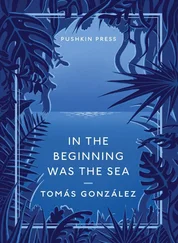Neal Stephenson - In the Beginning was the Command Line
Здесь есть возможность читать онлайн «Neal Stephenson - In the Beginning was the Command Line» весь текст электронной книги совершенно бесплатно (целиком полную версию без сокращений). В некоторых случаях можно слушать аудио, скачать через торрент в формате fb2 и присутствует краткое содержание. Жанр: Фантастика и фэнтези, на английском языке. Описание произведения, (предисловие) а так же отзывы посетителей доступны на портале библиотеки ЛибКат.
- Название:In the Beginning was the Command Line
- Автор:
- Жанр:
- Год:неизвестен
- ISBN:нет данных
- Рейтинг книги:5 / 5. Голосов: 1
-
Избранное:Добавить в избранное
- Отзывы:
-
Ваша оценка:
- 100
- 1
- 2
- 3
- 4
- 5
In the Beginning was the Command Line: краткое содержание, описание и аннотация
Предлагаем к чтению аннотацию, описание, краткое содержание или предисловие (зависит от того, что написал сам автор книги «In the Beginning was the Command Line»). Если вы не нашли необходимую информацию о книге — напишите в комментариях, мы постараемся отыскать её.
In the Beginning was the Command Line — читать онлайн бесплатно полную книгу (весь текст) целиком
Ниже представлен текст книги, разбитый по страницам. Система сохранения места последней прочитанной страницы, позволяет с удобством читать онлайн бесплатно книгу «In the Beginning was the Command Line», без необходимости каждый раз заново искать на чём Вы остановились. Поставьте закладку, и сможете в любой момент перейти на страницу, на которой закончили чтение.
Интервал:
Закладка:
But this special quality of words and of written communication would have the same effect on Disney's product as spray-painted graffiti on a magic mirror. So Disney does most of its communication without resorting to words, and for the most part, the words aren't missed. Some of Disney's older properties, such as Peter Pan, Winnie the Pooh, and Alice in Wonderland, came out of books. But the authors' names are rarely if ever mentioned, and you can't buy the original books at the Disney store. If you could, they would all seem old and queer, like very bad knockoffs of the purer, more authentic Disney versions. Compared to more recent productions like Beauty and the Beast and Mulan, the Disney movies based on these books (particularly Alice in Wonderland and Peter Pan) seem deeply bizarre, and not wholly appropriate for children. That stands to reason, because Lewis Carroll and J.M. Barrie were very strange men, and such is the nature of the written word that their personal strangeness shines straight through all the layers of Disneyfication like x-rays through a wall. Probably for this very reason, Disney seems to have stopped buying books altogether, and now finds its themes and characters in folk tales, which have the lapidary, time-worn quality of the ancient bricks in the Maharajah's ruins.
If I can risk a broad generalization, most of the people who go to Disney World have zero interest in absorbing new ideas from books. Which sounds snide, but listen: they have no qualms about being presented with ideas in other forms. Disney World is stuffed with environmental messages now, and the guides at Animal Kingdom can talk your ear off about biology.
If you followed those tourists home, you might find art, but it would be the sort of unsigned folk art that's for sale in Disney World's African- and Asian-themed stores. In general they only seem comfortable with media that have been ratified by great age, massive popular acceptance, or both.
In this world, artists are like the anonymous, illiterate stone carvers who built the great cathedrals of Europe and then faded away into unmarked graves in the churchyard. The cathedral as a whole is awesome and stirring in spite, and possibly because, of the fact that we have no idea who built it. When we walk through it we are communing not with individual stone carvers but with an entire culture.
Disney World works the same way. If you are an intellectual type, a reader or writer of books, the nicest thing you can say about this is that the execution is superb. But it's easy to find the whole environment a little creepy, because something is missing: the translation of all its content into clear explicit written words, the attribution of the ideas to specific people. You can't argue with it. It seems as if a hell of a lot might be being glossed over, as if Disney World might be putting one over on us, and possibly getting away with all kinds of buried assumptions and muddled thinking.
But this is precisely the same as what is lost in the transition from the command-line interface to the GUI.
Disney and Apple/Microsoft are in the same business: short-circuiting laborious, explicit verbal communication with expensively designed interfaces. Disney is a sort of user interface unto itself--and more than just graphical. Let's call it a Sensorial Interface. It can be applied to anything in the world, real or imagined, albeit at staggering expense.
Why are we rejecting explicit word-based interfaces, and embracing graphical or sensorial ones--a trend that accounts for the success of both Microsoft and Disney?
Part of it is simply that the world is very complicated now--much more complicated than the hunter-gatherer world that our brains evolved to cope with--and we simply can't handle all of the details. We have to delegate. We have no choice but to trust some nameless artist at Disney or programmer at Apple or Microsoft to make a few choices for us, close off some options, and give us a conveniently packaged executive summary.
But more importantly, it comes out of the fact that, during this century, intellectualism failed, and everyone knows it. In places like Russia and Germany, the common people agreed to loosen their grip on traditional folkways, mores, and religion, and let the intellectuals run with the ball, and they screwed everything up and turned the century into an abbatoir. Those wordy intellectuals used to be merely tedious; now they seem kind of dangerous as well.
We Americans are the only ones who didn't get creamed at some point during all of this. We are free and prosperous because we have inherited political and values systems fabricated by a particular set of eighteenth-century intellectuals who happened to get it right. But we have lost touch with those intellectuals, and with anything like intellectualism, even to the point of not reading books any more, though we are literate. We seem much more comfortable with propagating those values to future generations nonverbally, through a process of being steeped in media. Apparently this actually works to some degree, for police in many lands are now complaining that local arrestees are insisting on having their Miranda rights read to them, just like perps in American TV cop shows. When it's explained to them that they are in a different country, where those rights do not exist, they become outraged. Starsky and Hutch reruns, dubbed into diverse languages, may turn out, in the long run, to be a greater force for human rights than the Declaration of Independence.
A huge, rich, nuclear-tipped culture that propagates its core values through media steepage seems like a bad idea. There is an obvious risk of running astray here. Words are the only immutable medium we have, which is why they are the vehicle of choice for extremely important concepts like the Ten Commandments, the Koran, and the Bill of Rights. Unless the messages conveyed by our media are somehow pegged to a fixed, written set of precepts, they can wander all over the place and possibly dump loads of crap into people's minds.
Orlando used to have a military installation called McCoy Air Force Base, with long runways from which B-52s could take off and reach Cuba, or just about anywhere else, with loads of nukes. But now McCoy has been scrapped and repurposed. It has been absorbed into Orlando's civilian airport. The long runways are being used to land 747-loads of tourists from Brazil, Italy, Russia and Japan, so that they can come to Disney World and steep in our media for a while.
To traditional cultures, especially word-based ones such as Islam, this is infinitely more threatening than the B-52s ever were. It is obvious, to everyone outside of the United States, that our arch-buzzwords, multiculturalism and diversity, are false fronts that are being used (in many cases unwittingly) to conceal a global trend to eradicate cultural differences. The basic tenet of multiculturalism (or "honoring diversity" or whatever you want to call it) is that people need to stop judging each other-to stop asserting (and, eventually, to stop believing) that this is right and that is wrong, this true and that false, one thing ugly and another thing beautiful, that God exists and has this or that set of qualities.
The lesson most people are taking home from the Twentieth Century is that, in order for a large number of different cultures to coexist peacefully on the globe (or even in a neighborhood) it is necessary for people to suspend judgment in this way. Hence (I would argue) our suspicion of, and hostility towards, all authority figures in modern culture. As David Foster Wallace has explained in his essay "E Unibus Pluram," this is the fundamental message of television; it is the message that people take home, anyway, after they have steeped in our media long enough. It's not expressed in these highfalutin terms, of course. It comes through as the presumption that all authority figures--teachers, generals, cops, ministers, politicians--are hypocritical buffoons, and that hip jaded coolness is the only way to be.
Читать дальшеИнтервал:
Закладка:
Похожие книги на «In the Beginning was the Command Line»
Представляем Вашему вниманию похожие книги на «In the Beginning was the Command Line» списком для выбора. Мы отобрали схожую по названию и смыслу литературу в надежде предоставить читателям больше вариантов отыскать новые, интересные, ещё непрочитанные произведения.
Обсуждение, отзывы о книге «In the Beginning was the Command Line» и просто собственные мнения читателей. Оставьте ваши комментарии, напишите, что Вы думаете о произведении, его смысле или главных героях. Укажите что конкретно понравилось, а что нет, и почему Вы так считаете.








